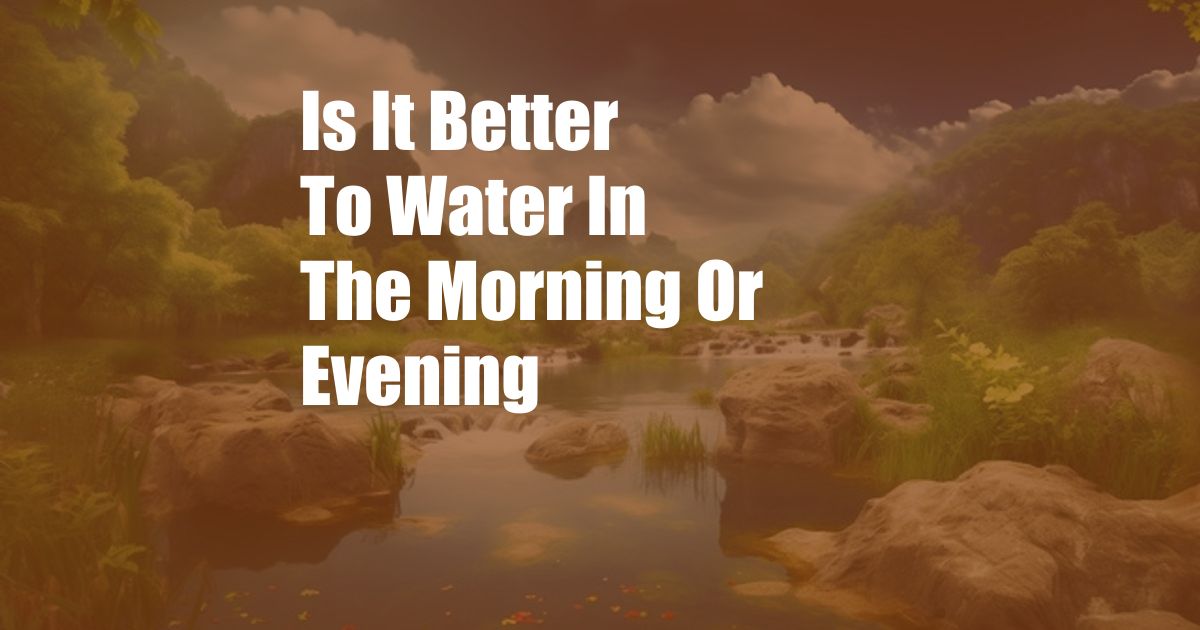
Is It Better to Water in the Morning or Evening?
As an avid gardener, I’ve always been intrigued by the age-old question of whether it’s better to water plants in the morning or evening. I’ve heard countless opinions, some claiming that morning watering is ideal, while others swear by the benefits of an evening soak. Determined to uncover the truth, I embarked on a thorough investigation, delving into scientific studies, consulting experts, and tapping into the collective wisdom of gardening communities.
In this comprehensive guide, I’ll share the insights I’ve gained, providing a balanced perspective on the best time to water your plants. Armed with this knowledge, you’ll be equipped to make an informed decision that optimizes the health and vitality of your beloved greenery.
Optimal Watering Time: Factoring in Science and Nature’s Rhythm
The timing of watering is crucial as it directly impacts the plant’s ability to absorb and utilize water. Morning watering is often recommended because it allows the water to soak into the soil gradually, minimizing evaporation losses. As the sun rises, the air temperature increases, drawing moisture from the leaves and soil through a process called transpiration. This creates a suction effect, pulling water from the roots to the leaves.
However, watering in the evening offers advantages as well. During the cooler evening hours, evaporation rates are lower, so more water is available to the plant. Additionally, the darkness inhibits transpiration, allowing the roots to absorb water more efficiently. This is especially beneficial in hot, dry climates, where water conservation is paramount.
Balancing Factors: Plant Type, Weather Conditions, and Soil Composition
The ideal watering time may vary depending on specific factors, such as the type of plant, weather conditions, and soil composition.
Some plants, like succulents and cacti, are adapted to arid environments and prefer infrequent watering. In these cases, morning watering is better as it allows the soil to dry out more quickly, preventing root rot. Conversely, moisture-loving plants, such as ferns and tropicals, may benefit from evening watering to ensure they have adequate hydration throughout the night.
Weather conditions also play a role. In hot, sunny weather, morning watering is generally better to prevent water loss through evaporation. In cooler, cloudy weather, evening watering may be more effective as there is less evaporation.
Lastly, soil composition can influence the optimal watering time. Sandy soils drain quickly, so more frequent watering may be necessary. Conversely, clay soils hold water well, so less frequent watering is needed. In clay soils, evening watering is often preferable as it allows the water to penetrate deeper into the soil.
Tips and Expert Advice for Effective Watering
In addition to the timing of watering, there are other best practices to consider for effective plant hydration:
1. Water deeply and infrequently. Deep watering encourages roots to grow deeper, making the plant more resilient to drought. Avoid shallow watering, as it promotes shallow root growth, leading to instability and susceptibility to drought.
2. Mulch around plants. Mulch acts as a protective blanket, retaining moisture in the soil and suppressing weeds. It also regulates soil temperature, keeping roots cool in summer and warm in winter.
3. Consider using rainwater or graywater. Rainwater is free, soft, and naturally beneficial for plants. Graywater, which is water from sinks, showers, and laundry, can also be used for irrigation, provided it does not contain harsh chemicals.
4. Avoid overwatering. Overwatering can lead to waterlogged soil, depriving roots of oxygen and promoting root rot. Use a soil moisture meter to check soil moisture before watering.
5. Water at the base of the plant. Avoid watering the leaves, as this can promote disease and sunscald. Direct water to the soil around the base of the plant, where the roots can absorb it most effectively.
Frequently Asked Questions
Q: What are the signs of underwatering?
A: Signs of underwatering include wilting, dry soil, yellowing or browning leaves, and stunted growth.
Q: What are the signs of overwatering?
A: Overwatering may manifest as yellowing or wilting leaves, waterlogged soil, and root rot (characterized by brown, mushy roots).
Q: Can I water plants in the rain?
A: Yes, natural rainfall provides excellent hydration for plants. However, avoid watering immediately after a heavy downpour, as the soil may be too saturated.
Conclusion
The debate over the best time to water plants is as old as gardening itself. While both morning and evening watering have their advantages, the optimal time may vary depending on the specific plant, weather conditions, and soil type. By understanding the factors involved and following the tips and advice provided, you can make informed decisions about watering your plants, ensuring their health, vibrancy, and beauty.
I encourage you to experiment with different watering schedules and techniques to find what works best for your plants and your lifestyle. Whether you prefer the convenience of morning watering or the peace of mind that comes with evening hydration, remember that the most important aspect of watering is consistency. Regular, thorough watering will keep your plants thriving and flourishing, allowing you to enjoy their beauty and benefits for years to come.